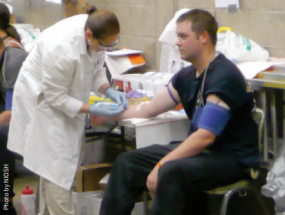"Firefighters are at an increased risk for rhabdomyolysis. Rhabdomyolysis, or rhabdo, is the breakdown of damaged muscles. This breakdown releases muscle cell contents (proteins and electrolytes) into the blood. This can damage the heart and kidneys, result in permanent disability, and can even be fatal! If treated early, most firefighters can return to work in a few days without lingering effects. Firefighters should learn the signs and symptoms of rhabdo and quickly seek medical care to prevent serious medical problems.
Why are firefighters at risk?
Anyone can get rhabdo, but firefighters (both structural and wildland) have increased risk due to their jobs. Job factors that can increase their risk include:
- Elevated core body temperature from
- exposure to fires
- working in hot seasons or geographic area (e.g., summer in the U.S. south)
- performing physically strenuous tasks (e.g., carrying chainsaws or heavy gear, victim rescue, climbing stairs or ladders with heavy equipment)
- wearing personal protective equipment (turnout gear) that can trap body heat
- Traumatic injuries to muscles (e.g., struck by collapsing structures or trees)
- Overuse injuries from performing strenuous tasks for long periods
How can firefighters protect themselves?
1.) Learn the signs and symptoms
- Muscle cramps, aches, or pains that are worse than expected
- Dark urine (tea- or cola-colored)
- Feeling weak, tired, or unable to complete typical job tasks or workout routine
Symptoms might not appear until several days after injury. Rhabdo signs and symptoms may look like other heat-related illnesses or dehydration. Only a blood test can tell if rhabdo is happening.

2.) Get medical care immediately whenever you have any symptoms that could be rhabdo
Early diagnosis and treatment are crucial to prevent serious long-term effects. The only way to know if you have rhabdo is to obtain a blood test.
Firefighters should download this wallet card and give it to their healthcare provider. The card reminds providers that firefighters are at risk for rhabdo and how to check for it. If you are a firefighter and have any symptoms, do not hesitate to give this card to your healthcare provider..."
Rhabdomyolysis

No comments:
Post a Comment